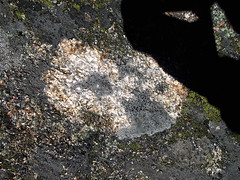" Mental Topography"
An art critic asked how an artist can show mental topography visually.
First, as a writer, I need a clean-cut definition of each word. A definition unhampered by prior preconceived notions. A clean slate. Start with mental. Is this the opposite of physical?.
Mental. Physical. Does the act of solving a crossword puzzle harbor an inherent superiority to cleaning the bathroom? The former may be an excuse to avoid the later. And isn't it possible, or probable that the two join, converge, bisect one another? Today when I cleaned the bathroom I thought of a puzzle clue and empty puzzle boxes. Perhaps my pondering the empty boxes invigorated my scrubbing or caused me to stare blankly at a water/ chemical stain— a line. Did I really want to remain on my knees contemplating the mineral deposit—genuflecting before the ring? I stood up and returned to the puzzle.
As for topography—the features of a place—or as the dictionary so aptly states—" the physical or natural features of an object or entity and their structural relationships."
Let's change the definition of mental to another dictionary defintion: "relating to the spirit or idea as opposed to matter." Now I'm closing in on an ethereal understanding. So if I'm to describe my metal typography or within the context of the quote—an artist depicting her mental typography visually—that's the rub. For the writer it's done with words. A cadre of words—at attention, waiting—Inert until manipulated. The act of manipulation engages a personal topography. And that topography, the stratal of living, permeates a writer's words.
Flannnery O'Connor's mental typography included her belief in the inexorable quality of redemption and grace. Her stories holler —grace and redemption, but they never utter those words. I'm reading James Baldwin and the topography of his spirit, his streets, his experience as a black man spreads itself out on the page.
So the bigger question —how do you as a writer recognize and allow your topography to flex itself without calling attention, without sounding didactic, without losing your story?
First, as a writer, I need a clean-cut definition of each word. A definition unhampered by prior preconceived notions. A clean slate. Start with mental. Is this the opposite of physical?.
Mental. Physical. Does the act of solving a crossword puzzle harbor an inherent superiority to cleaning the bathroom? The former may be an excuse to avoid the later. And isn't it possible, or probable that the two join, converge, bisect one another? Today when I cleaned the bathroom I thought of a puzzle clue and empty puzzle boxes. Perhaps my pondering the empty boxes invigorated my scrubbing or caused me to stare blankly at a water/ chemical stain— a line. Did I really want to remain on my knees contemplating the mineral deposit—genuflecting before the ring? I stood up and returned to the puzzle.
As for topography—the features of a place—or as the dictionary so aptly states—" the physical or natural features of an object or entity and their structural relationships."
Let's change the definition of mental to another dictionary defintion: "relating to the spirit or idea as opposed to matter." Now I'm closing in on an ethereal understanding. So if I'm to describe my metal typography or within the context of the quote—an artist depicting her mental typography visually—that's the rub. For the writer it's done with words. A cadre of words—at attention, waiting—Inert until manipulated. The act of manipulation engages a personal topography. And that topography, the stratal of living, permeates a writer's words.
Flannnery O'Connor's mental typography included her belief in the inexorable quality of redemption and grace. Her stories holler —grace and redemption, but they never utter those words. I'm reading James Baldwin and the topography of his spirit, his streets, his experience as a black man spreads itself out on the page.
So the bigger question —how do you as a writer recognize and allow your topography to flex itself without calling attention, without sounding didactic, without losing your story?



1 Comments:
Maybe the real question is, "Can anyone escape their mental topography?"
Jean
Post a Comment
<< Home